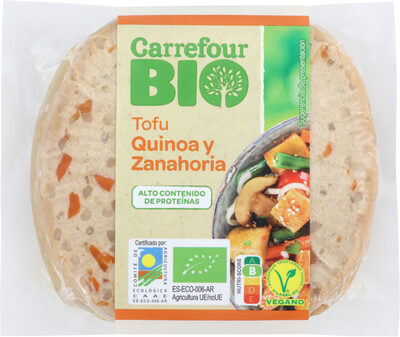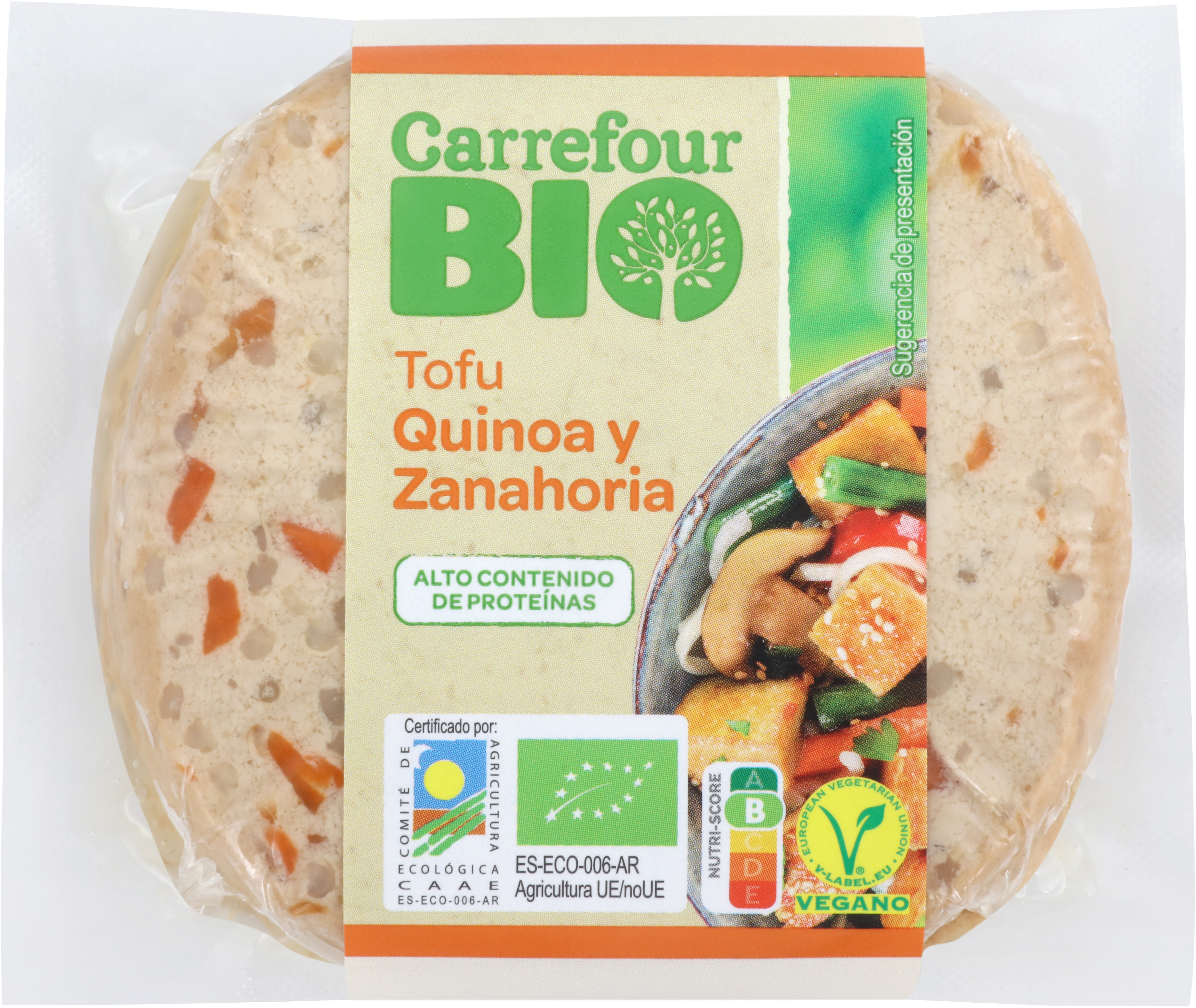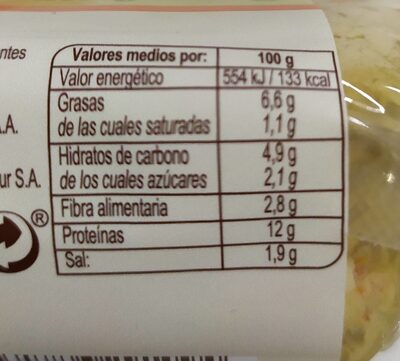Ajuda'ns a fer que la transparència alimentària sigui la norma!
Com a organització sense ànim de lucre, depenem de les vostres donacions per continuar informant els consumidors de tot el món sobre tot allò què mengen.
La revolució alimentària comença amb tu!
Tofu quinoa y zanahoria - Carrefour Bio
Tofu quinoa y zanahoria - Carrefour Bio
Aquesta pàgina del producte no està completa. Podeu ajudar a completar-la editant-la i afegint-hi més dades a partir de les fotos ja disponibles, o fent-ne més amb l'aplicació de androide o iPhone / iPad. Gràcies!
×
Algunes de les dades d’aquest producte les ha proporcionat directament el fabricant Carrefour España.
Codi de barres: 8431876291094 (EAN / EAN-13)
Marques: Carrefour Bio, Carrefour
Categories: Aliments i begudes amb base vegetal, Aliments amb base vegetal, Llegums i derivats, en:Meat alternatives, Tofu
Etiquetes, certificacions, premis:
Orgànic, Vegetarià, Orgànic UE, Vegà, ES-ECO-006-AR, Unió Vegetariana Europea, Unió Vegana Vegetariana Europea


Botigues: Carrefour
Països on es va vendre: Espanya
Matching with your preferences
Salut
Ingredients
-
23 ingredients
: Tofu* (78,6%) (agua, habas de soja*, estabilizante: sulfato de calcio), zanahoria* (7,6%), quinoa cocida* (7,5%) (agua, quinoa*, sal marina), cebolla*, caldo vegetal* (sal marina, harina de arroz*, extracto de levadura*, cebolla*, ajo*, aceite de girasol*), sal marina, gelificante: agar agar*, emulgente: lecitina de soja*. (*De agricultura ecológica).Al·lèrgens: en:SoybeansRastres: en:Celery, en:Eggs, en:Gluten, en:Milk, en:Mustard, en:Nuts, en:Sesame seeds
Processament d'aliments
-
Aliments ultra processats
Elements que indiquen que el producte està al grup 4 - Aliments i begudes ultraprocessats:
- Additiu: E322 - Lecitines
- Additiu: E406 - Agar
- Ingredient: Emulsionant
- Ingredient: Gelificant
Els productes alimentaris es classifiquen en 4 grups segons el seu grau de processament:
- Aliments no processats o mínimament processats
- Ingredients culinaris processats
- Aliments processats
- Aliments ultra processats
La determinació del grup es fa en funció de la categoria del producte i dels ingredients que conté.
Additius
-
E322 - Lecitines
Lecithin: Lecithin -UK: , US: , from the Greek lekithos, "egg yolk"- is a generic term to designate any group of yellow-brownish fatty substances occurring in animal and plant tissues, which are amphiphilic – they attract both water and fatty substances -and so are both hydrophilic and lipophilic-, and are used for smoothing food textures, dissolving powders -emulsifying-, homogenizing liquid mixtures, and repelling sticking materials.Lecithins are mixtures of glycerophospholipids including phosphatidylcholine, phosphatidylethanolamine, phosphatidylinositol, phosphatidylserine, and phosphatidic acid.Lecithin was first isolated in 1845 by the French chemist and pharmacist Theodore Gobley. In 1850, he named the phosphatidylcholine lécithine. Gobley originally isolated lecithin from egg yolk—λέκιθος lekithos is "egg yolk" in Ancient Greek—and established the complete chemical formula of phosphatidylcholine in 1874; in between, he had demonstrated the presence of lecithin in a variety of biological matters, including venous blood, in human lungs, bile, human brain tissue, fish eggs, fish roe, and chicken and sheep brain. Lecithin can easily be extracted chemically using solvents such as hexane, ethanol, acetone, petroleum ether, benzene, etc., or extraction can be done mechanically. It is usually available from sources such as soybeans, eggs, milk, marine sources, rapeseed, cottonseed, and sunflower. It has low solubility in water, but is an excellent emulsifier. In aqueous solution, its phospholipids can form either liposomes, bilayer sheets, micelles, or lamellar structures, depending on hydration and temperature. This results in a type of surfactant that usually is classified as amphipathic. Lecithin is sold as a food additive and dietary supplement. In cooking, it is sometimes used as an emulsifier and to prevent sticking, for example in nonstick cooking spray.Origen: Wikipedia (Anglès)
-
E322i - Lecitina
Lecithin: Lecithin -UK: , US: , from the Greek lekithos, "egg yolk"- is a generic term to designate any group of yellow-brownish fatty substances occurring in animal and plant tissues, which are amphiphilic – they attract both water and fatty substances -and so are both hydrophilic and lipophilic-, and are used for smoothing food textures, dissolving powders -emulsifying-, homogenizing liquid mixtures, and repelling sticking materials.Lecithins are mixtures of glycerophospholipids including phosphatidylcholine, phosphatidylethanolamine, phosphatidylinositol, phosphatidylserine, and phosphatidic acid.Lecithin was first isolated in 1845 by the French chemist and pharmacist Theodore Gobley. In 1850, he named the phosphatidylcholine lécithine. Gobley originally isolated lecithin from egg yolk—λέκιθος lekithos is "egg yolk" in Ancient Greek—and established the complete chemical formula of phosphatidylcholine in 1874; in between, he had demonstrated the presence of lecithin in a variety of biological matters, including venous blood, in human lungs, bile, human brain tissue, fish eggs, fish roe, and chicken and sheep brain. Lecithin can easily be extracted chemically using solvents such as hexane, ethanol, acetone, petroleum ether, benzene, etc., or extraction can be done mechanically. It is usually available from sources such as soybeans, eggs, milk, marine sources, rapeseed, cottonseed, and sunflower. It has low solubility in water, but is an excellent emulsifier. In aqueous solution, its phospholipids can form either liposomes, bilayer sheets, micelles, or lamellar structures, depending on hydration and temperature. This results in a type of surfactant that usually is classified as amphipathic. Lecithin is sold as a food additive and dietary supplement. In cooking, it is sometimes used as an emulsifier and to prevent sticking, for example in nonstick cooking spray.Origen: Wikipedia (Anglès)
-
E406 - Agar
Agar: Agar -pronounced , sometimes - or agar-agar is a jelly-like substance, obtained from red algae.Agar is a mixture of two components: the linear polysaccharide agarose, and a heterogeneous mixture of smaller molecules called agaropectin. It forms the supporting structure in the cell walls of certain species of algae, and is released on boiling. These algae are known as agarophytes, and belong to the Rhodophyta -red algae- phylum.Agar has been used as an ingredient in desserts throughout Asia, and also as a solid substrate to contain culture media for microbiological work. Agar can be used as a laxative, an appetite suppressant, a vegetarian substitute for gelatin, a thickener for soups, in fruit preserves, ice cream, and other desserts, as a clarifying agent in brewing, and for sizing paper and fabrics.The gelling agent in agar is an unbranched polysaccharide obtained from the cell walls of some species of red algae, primarily from tengusa -Gelidiaceae- and ogonori -Gracilaria-. For commercial purposes, it is derived primarily from ogonori. In chemical terms, agar is a polymer made up of subunits of the sugar galactose.Origen: Wikipedia (Anglès)
Anàlisi dels ingredients
-
No conté oli de palma
No s'han detectat ingredients que continguin oli de palma
-
Vegà
No s'han detectat ingredients no vegans
-
Vegetarià
No s'han detectat ingredients no vegetarians
-
Detalls de l'anàlisi dels ingredients
: Tofu 78.6% (agua, habas de soja, estabilizante (sulfato de calcio)), zanahoria 7.6%, quinoa 7.5% (agua, quinoa, sal marina), cebolla, caldo vegetal (sal marina, harina de arroz, extracto de levadura, cebolla, ajo, aceite de girasol), sal marina, gelificante (agar agar), emulgente (lecitina de soja)- Tofu -> en:tofu - labels: en:organic - vegan: yes - vegetarian: yes - ciqual_food_code: 20904 - percent_min: 78.6 - percent: 78.6 - percent_max: 78.6
- agua -> en:water - vegan: yes - vegetarian: yes - ciqual_food_code: 18066 - percent_min: 26.2 - percent_max: 78.6
- habas de soja -> en:soya-bean - labels: en:organic - vegan: yes - vegetarian: yes - ciqual_food_code: 20901 - percent_min: 0 - percent_max: 39.3
- estabilizante -> en:stabiliser - percent_min: 0 - percent_max: 26.2
- sulfato de calcio -> en:e516 - vegan: yes - vegetarian: yes - percent_min: 0 - percent_max: 26.2
- zanahoria -> en:carrot - labels: en:organic - vegan: yes - vegetarian: yes - ciqual_food_code: 20009 - percent_min: 7.6 - percent: 7.6 - percent_max: 7.6
- quinoa -> en:quinoa - labels: en:organic - vegan: yes - vegetarian: yes - ciqual_food_code: 9340 - percent_min: 7.5 - percent: 7.5 - percent_max: 7.5
- agua -> en:water - vegan: yes - vegetarian: yes - ciqual_food_code: 18066 - percent_min: 2.5 - percent_max: 7.5
- quinoa -> en:quinoa - labels: en:organic - vegan: yes - vegetarian: yes - ciqual_food_code: 9340 - percent_min: 0 - percent_max: 3.75
- sal marina -> en:sea-salt - vegan: yes - vegetarian: yes - ciqual_food_code: 11082 - percent_min: 0 - percent_max: 1.9
- cebolla -> en:onion - labels: en:organic - vegan: yes - vegetarian: yes - ciqual_food_code: 20034 - percent_min: 1.26 - percent_max: 6.30000000000001
- caldo vegetal -> en:vegetable-juice - labels: en:organic - vegan: yes - vegetarian: yes - percent_min: 0 - percent_max: 4.18
- sal marina -> en:sea-salt - vegan: yes - vegetarian: yes - ciqual_food_code: 11082 - percent_min: 0 - percent_max: 1.9
- harina de arroz -> en:rice-flour - labels: en:organic - vegan: yes - vegetarian: yes - ciqual_food_code: 9520 - percent_min: 0 - percent_max: 1.9
- extracto de levadura -> en:yeast-extract - labels: en:organic - vegan: yes - vegetarian: yes - percent_min: 0 - percent_max: 1.39333333333333
- cebolla -> en:onion - labels: en:organic - vegan: yes - vegetarian: yes - ciqual_food_code: 20034 - percent_min: 0 - percent_max: 1.045
- ajo -> en:garlic - labels: en:organic - vegan: yes - vegetarian: yes - ciqual_food_code: 11000 - percent_min: 0 - percent_max: 0.836000000000001
- aceite de girasol -> en:sunflower-oil - labels: en:organic - vegan: yes - vegetarian: yes - from_palm_oil: no - ciqual_food_code: 17440 - percent_min: 0 - percent_max: 0.696666666666667
- sal marina -> en:sea-salt - vegan: yes - vegetarian: yes - ciqual_food_code: 11082 - percent_min: 0 - percent_max: 1.9
- gelificante -> en:gelling-agent - percent_min: 0 - percent_max: 1.9
- agar agar -> en:e406 - labels: en:organic - vegan: yes - vegetarian: yes - ciqual_food_code: 11084 - percent_min: 0 - percent_max: 1.9
- emulgente -> en:emulsifier - percent_min: 0 - percent_max: 1.9
- lecitina de soja -> en:soya-lecithin - labels: en:organic - vegan: yes - vegetarian: yes - ciqual_food_code: 42200 - percent_min: 0 - percent_max: 1.9
- Tofu -> en:tofu - labels: en:organic - vegan: yes - vegetarian: yes - ciqual_food_code: 20904 - percent_min: 78.6 - percent: 78.6 - percent_max: 78.6
Nutrició
-
Qualitat nutricional mitjana
Aquest producte no es considera una beguda per al càlcul de la Nutri-Score.
Punts positius: 7
- Proteïnes: 5 / 5 (valor: 12, valor arrodonit: 12)
- Fibra: 2 / 5 (valor: 2.8, valor arrodonit: 2.8)
- Fruites, verdures, fruits secs i olis de colza/nou/oliva: 0 / 5 (valor: 0, valor arrodonit: 0)
Punts negatius: 10
- Energia: 1 / 10 (valor: 554, valor arrodonit: 554)
- Sucres: 0 / 10 (valor: 2.1, valor arrodonit: 2.1)
- Greixos saturats: 1 / 10 (valor: 1.1, valor arrodonit: 1.1)
- Sodi: 8 / 10 (valor: 760, valor arrodonit: 760)
Els punts per proteïnes es compten perquè els punts negatius són inferiors a 11.
Puntuació nutricional: (10 - 7)
Nutri-Score:
-
Nivells de nutrients
-
Greix en Quantitat moderada (6.6%)
Què us cal saber- Un alt consum de greixos, especialment de greixos saturats, pot augmentar el colesterol, que augmenta el risc de patir malalties del cor.
Recomanació: Reduïu el consum de greixos i greixos saturats- Trieu productes amb menys greixos i greixos saturats.
-
Àcid gras saturat en baixa quantitat (1.1%)
Què us cal saber- Un alt consum de greixos, especialment de greixos saturats, pot augmentar el colesterol, que augmenta el risc de patir malalties del cor.
Recomanació: Reduïu el consum de greixos i greixos saturats- Trieu productes amb menys greixos i greixos saturats.
-
Sucre en baixa quantitat (2.1%)
Què us cal saber- Un alt consum de sucre pot provocar augment de pes i càries dental. També augmenta el risc de patir diabetis tipus 2 i malalties cardiovasculars.
Recomanació: Limitau el consum de sucre i de begudes ensucrades- Les begudes ensucrades (com ara refrescos, begudes de fruites i sucs i nèctars de fruites) s'han de limitar tant com sigui possible (no més d'1 got al dia).
- Triau productes amb menor contingut de sucre i reduïu el consum de productes amb sucres afegits.
-
Sal comuna en alta quantitat (1.9%)
Què us cal saber- Un alt consum de sal (o sodi) pot provocar un augment de la pressió arterial, que pot augmentar el risc de patir malalties del cor i ictus.
- Moltes persones que tenen hipertensió no ho saben, ja que sovint no en tenen símptomes.
- La majoria de la gent consumeix massa sal (de 9 a 12 grams de mitjana al dia), al voltant del doble del nivell màxim d'ingesta recomanat.
Recomanació: Limitau la ingesta de sal i d'aliments rics en sal- Reduïu la sal que emprau quan cuinau, i no afegiu sal a taula.
- Limiteu el consum d'aperitius salats i trieu productes amb menor contingut de sal.
-
-
Informació nutricional
Informació nutricional Com es ven
per 100 g/100 mlComparat amb: Tofu Energia 554 kj
(133 kcal)-12% Greix 6,6 g -21% Àcid gras saturat 1,1 g -22% Hidrats de carboni 4,9 g +99% Sucre 2,1 g +278% Fiber 2,8 g +36% Proteïna 12 g -14% Sal comuna 1,9 g +199% Fruits‚ vegetables‚ nuts and rapeseed‚ walnut and olive oils 43 % Fruits‚ vegetables‚ nuts and rapeseed‚ walnut and olive oils (estimate from ingredients list analysis) 25,74 %
Entorn
-
Eco-puntuació B - Impacte ambiental baix
El Eco-Score és una puntuació experimental que resumeix els impactes ambientals dels productes alimentaris.→ L'Eco-Score es va desenvolupar inicialment a França i s'està ampliant per a altres països europeus. La fórmula Eco-Score està subjecta a canvis, ja que es millora periòdicament per fer-la més precisa i més adequada per a cada país.Anàlisi del cicle de vida
-
Impacte mitjà dels productes de la mateixa categoria: A (Score: 97/100)
Categoria: Tofu, plain
Categoria: Tofu, plain
- Puntuació ambiental PEF ( petjada ambiental de l'aliment ): 0.09 (com més baixa sigui la puntuació, menor serà l'impacte)
- incloent l'impacte sobre el canvi climàtic: 0.67 kg CO₂ eq/kg del producte
Etapa Impacte Agricultura
14.0 %Processament
33.9 %Empaquetament
17.6 %Transport
17.1 %Distribució
10.2 %Consum
7.3 %
Bonificacions i punts negatius
-
Etiquetes amb alts beneficis ambientals
Bonificació: +15
-
Orgànic UE
Organic agriculture contributes to preserve biodiversity, climate, water quality and soil fertility.
Organic food is food produced by methods complying with the standards of organic farming and features practices that cycle resources, promote ecological balance, and conserve biodiversity.
-
-
Falta informació sobre l'origen dels ingredients
Punts negatius: -5
⚠ ️ L'origen dels ingredients d'aquest producte no està indicat.
Si estan indicats a l'embalatge, podeu modificar la fitxa del producte i afegir-los.
Si sou el fabricant d'aquest producte, podeu enviar-nos la informació amb la nostra plataforma gratuïta per a productors.
-
Falta informació sobre l'embalatge d'aquest producte
Punts negatius: -15
⚠ ️ La informació sobre l'embalatge d'aquest producte no està completada.⚠ ️ Per a un càlcul més precís de l'Eco-Score, podeu modificar la pàgina del producte i afegir-los.
Si sou el fabricant d'aquest producte, podeu enviar-nos la informació amb la nostra plataforma gratuïta per a productors.
Eco-Score per a aquest producte
-
Impacte per a aquest producte: B (Score: 79/100)
Producte: Tofu quinoa y zanahoria - Carrefour Bio
Puntuació de l'anàlisi del cicle de vida: 97
Suma de bonificacions i punts negatius: -5
Puntuació final: 79/100 (La puntuació de productes amb materials d'embalatge no reciclables i no biodegradables està limitada a 79 (nota B).)
-
Petjada de carboni
-
Equivalent a conduir 0.3 km en un cotxe de gasolina
67 g de CO² per cada 100 g de producte
La xifra d'emissions de carboni prové de la base de dades Agribalyse d'ADEME, per a la categoria: Tofu, plain (Font: Base de dades ADEME Agribalyse)
Etapa Impacte Agricultura
12.5 %Processament
21.9 %Empaquetament
27.9 %Transport
29.4 %Distribució
5.6 %Consum
2.7 %
Empaquetament
-
Falta informació sobre l'embalatge d'aquest producte
⚠ ️ La informació sobre l'embalatge d'aquest producte no està completada.Take a photo of the recycling information Take a photo of the recycling information
Transport
-
Orígens dels ingredients
Falta informació sobre l'origen dels ingredients
⚠ ️ L'origen dels ingredients d'aquest producte no està indicat.
Si estan indicats a l'embalatge, podeu modificar la fitxa del producte i afegir-los.
Si sou el fabricant d'aquest producte, podeu enviar-nos la informació amb la nostra plataforma gratuïta per a productors.Add the origins of ingredients for this product Add the origins of ingredients for this product
Etiquetes
-
Orgànic UE
Organic agriculture contributes to preserve biodiversity, climate, water quality and soil fertility.
Organic food is food produced by methods complying with the standards of organic farming and features practices that cycle resources, promote ecological balance, and conserve biodiversity.
Report a problem
-
Incomplete or incorrect information?
Category, labels, ingredients, allergens, nutritional information, photos etc.
If the information does not match the information on the packaging, please complete or correct it. Open Food Facts is a collaborative database, and every contribution is useful for all.
Fonts de dades
Producte afegit per kiliweb
Última modificació de la pàgina del producte per itsjustruby.
La pàgina del producte, també editada per ecoscore-impact-estimator, moon-rabbit, org-carrefour-espana, roboto-app, teolemon, yuka.sY2b0xO6T85zoF3NwEKvllZETPDhjDzObzvVtVax4cu1L5a2etwi_I6hEKs.










